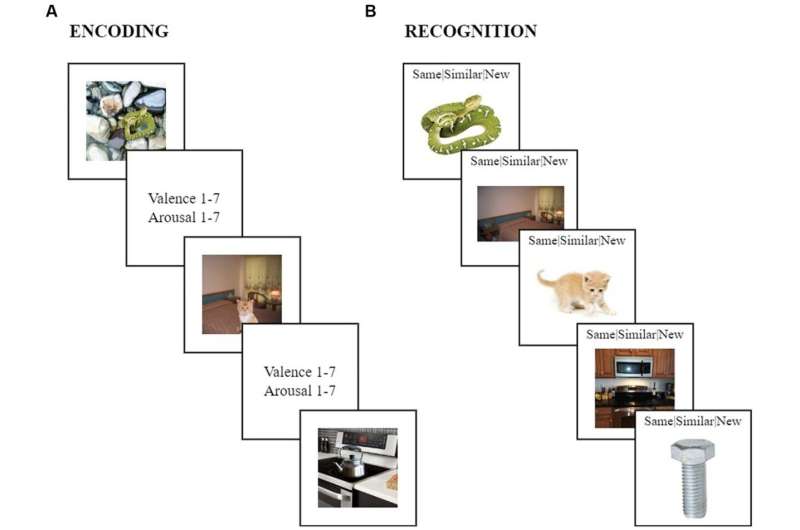February 14, 2024 feature
This article has been reviewed according to Science X's editorial process and policies. Editors have highlighted the following attributes while ensuring the content's credibility:
fact-checked
peer-reviewed publication
trusted source
proofread
Study hints at an early shift towards a more positive attitude in middle-aged people

Past psychology studies have found that on average, older adults tend to view the world in a more positive light than younger adults. People in their 30s to 50s, in fact, often display a negativity bias, which essentially means that they are more prone to remember unfavorable and information interpret neutral events in a negative light.
As they age, on the other hand, humans appear to prioritize positive information, despite the cognitive deficits that often emerge in older age. For example, studies have found that healthy older adults tend to prefer looking at happy faces compared to fearful facial expressions and are also more likely to remember positive information.
Researchers at University of Notre Dame recently set out to further investigate this shift towards greater positivity observed in late adult life. Their findings, published in Frontiers in Behavioral Neuroscience, suggest that the previously observed changes towards greater positivity could start earlier than anticipated, specifically at midlife.
"While younger adults are more likely to attend to, process, and remember negative relative to positive information, healthy older adults show the opposite pattern," Xinran Niu, Mia F. Utayde and their colleagues wrote in their paper. "The current study evaluates when, exactly, this positivity shift begins and how it influences memory performance for positive, negative, and neutral information."
As part of their study, Niu, Utayde and their colleagues carried out a series of experiments involving 274 healthy adults, which were categorized in three distinct age groups: middle-aged (35-47 years old), late middle-aged (48-59 years old) and older adults (<59 years old). These participants all completed a so-called emotional memory trade-off task.
As part of this task, the participants were presented with 72 different scenes in a random order, each shown on the screen for 5 seconds. Notably, the objects in 24 of these scenes had emotionally negative qualities, 24 had emotionally positive qualities, and 24 were neutral. All these objects were placed on what would generally be perceived as a neutral background.
After viewing each of these scenes, the participants were asked to rate their emotional valence from 1 to 7, where 1 represented very negative, 4 neutral, and 7 very positive. They were also asked to rate their arousal-related qualities, with 1 being 'calming' and 7 agitating or exciting.
"After 12 h spanning a night of sleep or a day of wakefulness, participants completed an unexpected memory test during which they were shown objects and backgrounds separately and indicated whether the scene component was the 'same,' 'similar,' or 'new' compared to what they viewed during the study session," the researchers explained in their paper.
"We found that both late middle-aged and older adults rated positive and neutral scenes more positively compared to early middle-aged adults. However, only older adults showed better memory for positive objects relative to negative objects, and a greater positive memory trade-off magnitude (i.e., remembering positive objects at the cost of their associated neutral backgrounds) than negative memory trade-off magnitude (i.e., remembering negative objects at the cost of their associated neutral backgrounds)," they continued.
Overall, the findings gathered by this team of researchers suggest that the positivity bias observed in older adults (above 59 years of age) is also often exhibited by late middle-aged people, specifically those aged between 48 and 59 years old. Nonetheless, while older adults appeared to commonly recall positive objects more often than negative ones, and often recalled positive objects but forgot the neutral backgrounds behind them, this trend was not observed in late middle-aged individuals.
Essentially, this recent study suggests that a shift towards greater positivity could emerge towards the end of midlife, particularly in terms of the processing of stimuli. These results could soon inspire further studies focusing on emotional processing at different stages of life, which could collectively gather new insight into how the passing of time impacts people's well-being.
"Our findings support the age-related positivity effect in memory across a relatively long consolidation delay (approximately 12-h)," the researchers conclude in their paper. "Moreover, we provide well-powered evidence that while a shift toward positive processing emerges in middle age, the positivity bias in memory may not emerge until older adulthood. Efforts to further understand these age-related positivity effects, their mechanisms, boundary conditions, and impact on cognitive and emotional processing will be important if we are to better understand and promote mental well-being and cognitive functioning in aging adults."
More information: Xinran Niu et al, Age-related positivity effect in emotional memory consolidation from middle age to late adulthood, Frontiers in Behavioral Neuroscience (2024). DOI: 10.3389/fnbeh.2024.1342589
© 2024 Science X Network



















